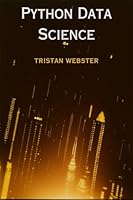
Bayesian Analysis with Python – Third Edition: A practical guide to probabilistic modeling
- Length: 394 pages
- Edition: 3
- Language: English
- Publisher: Packt Publishing
- Publication Date: 2024-01-31
- ISBN-10: 1805127160
- ISBN-13: 9781805127161
- Sales Rank: #0 (See Top 100 Books)
Learn the fundamentals of Bayesian modeling using state-of-the-art Python libraries, such as PyMC, ArviZ, Bambi, and more, guided by an experienced Bayesian modeler who contributes to these libraries
Key Features:
- Conduct Bayesian data analysis with step-by-step guidance
- Gain insight into a modern, practical, and computational approach to Bayesian statistical modeling
- Enhance your learning with best practices through sample problems and practice exercises
- Purchase of the print or Kindle book includes a free PDF eBook.
Book Description:
The third edition of Bayesian Analysis with Python serves as an introduction to the main concepts of applied Bayesian modeling using PyMC, a state-of-the-art probabilistic programming library, and other libraries that support and facilitate modeling like ArviZ, for exploratory analysis of Bayesian models; Bambi, for flexible and easy hierarchical linear modeling; PreliZ, for prior elicitation; PyMC-BART, for flexible non-parametric regression; and Kulprit, for variable selection.
In this updated edition, a brief and conceptual introduction to probability theory enhances your learning journey by introducing new topics like Bayesian additive regression trees (BART), featuring updated examples. Refined explanations, informed by feedback and experience from previous editions, underscore the book’s emphasis on Bayesian statistics. You will explore various models, including hierarchical models, generalized linear models for regression and classification, mixture models, Gaussian processes, and BART, using synthetic and real datasets.
By the end of this book, you will possess a functional understanding of probabilistic modeling, enabling you to design and implement Bayesian models for your data science challenges. You’ll be well-prepared to delve into more advanced material or specialized statistical modeling if the need arises.
What You Will Learn:
- Build probabilistic models using PyMC and Bambi
- Analyze and interpret probabilistic models with ArviZ
- Acquire the skills to sanity-check models and modify them if necessary
- Build better models with prior and posterior predictive checks
- Learn the advantages and caveats of hierarchical models
- Compare models and choose between alternative ones
- Interpret results and apply your knowledge to real-world problems
- Explore common models from a unified probabilistic perspective
- Apply the Bayesian framework’s flexibility for probabilistic thinking
Who this book is for:
If you are a student, data scientist, researcher, or developer looking to get started with Bayesian data analysis and probabilistic programming, this book is for you. The book is introductory, so no previous statistical knowledge is required, although some experience in using Python and scientific libraries like NumPy is expected.







